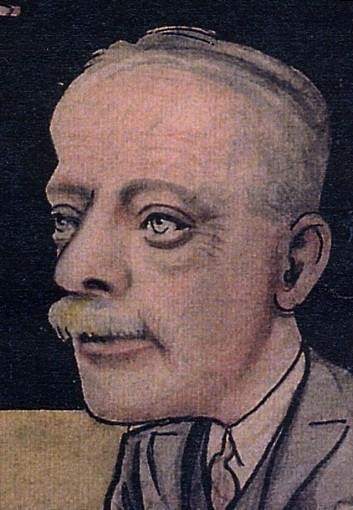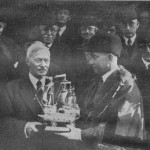Benson Honoured for His Service to Rye
By Jim Hollands
It is March 1938 – The winds of war are gathering and all Europe lives in fear of another conflict of arms – German troops had occupied the Rhineland in 1936, in direct conflict with their obligations under the terms of the 1918 surrender agreement. Hitler’s Army, Naval and Air strength was being built up at a rate that could only mean one thing – His aerial power was rehearsed and demonstrated in Spain in the civil war, Gurnica was flattened by bombing and the civilian population learned that wars would be total from now on with the civilian population in the front line – Winston Churchill was a voice in the wilderness – England slept on.
In Rye, the tranquillity of the ancient cobbled streets still captured the imagination of painters. photographers and writers. There was, as there is today, a sizeable group of people with true creative talent, one of whom stood with the very best. Edward Frederic Benson was an English novelist, biographer, memoirist, archaeologist and short story writer of the highest quality. He lived and worked at the historic Lamb House in East Street and was often to be found writing in the Garden Room.
Three Times Mayor of Rye
Three times Mayor of Rye and one of the town’s greatest benefactors, Mr. E. F. Benson, M.B.E. J.P., was on Tuesday 18 March 1938, awarded the honorary freedom of the Ancient Town and Borough, a distinction accorded to only seven persons since between 1885 and 1938.
The ceremony took place at the Town Hall. where the Mayor, Councillor George Marsden also handed to Mr. Benson the silver model of a frigate of the time of Henry VIII.
The Council resolution conferring the honour on Mr. Benson in recognition of his numerous services to the town of his adoption was read out by the Town Clerk, and the Mayor then requested Mr. Benson to take the oath.
“I, Edward Frederic Benson, shall in faith and truth bear unto our Sovereign Lord the King of England and to his heirs, and to the Right Worshipful the Mayor and Jurats and the Commonalty of the Antiente Towne of Rye from henceforth; and the State and the Franchises and Liberties of the same Town shall help, keep and maintain to the best of my power. And I shall not in no wise be knowing or consenting to break them nor hurt them. And my Scot and Lot of my goods and chattels, unto the aforesaid Commonalty, I shall well and truly pay, and content when I shall be Scotted and Lotted; so God me help.”
The Town Clerk’s fee in this respect was 2d., which Mr. Benson paid to Captain Dawes.
Mayor Marsden handed Mr. Benson a copy a of the resolution, and offered him “The right hand of fellowship.”
The Mayor’s Congratulations
Councillor Marsden, on behalf of Borough’s Aldermen and Councillors welcomed and congratulated Mr. Benson on becoming an honorary freeman of the town.
“There was no pecuniary or commercial benefit, and in fact it had already involved their new freeman in a pecuniary liability, which he had carried out, by giving the Town Clerk twopence.”
The Mayor explained the ceremony was not the same in all the Cinque Ports.
“If it had taken place at Sandwich I could I have claimed 12 pennies. Also I could have increased your already princely royalties by allowing you to sell fish in the High-street on Sundays!
The right of bestowing the honorary a freedom had existed In Rye only since a Statute of 1885. Before that a ‘foreigner’ wishing to become a freeman had to pay a substantial fine, and be proved to have an honest craft and be of good conversation. He was sure Mr. Benson fulfilled the last two qualifications. Further, in the old days, a man could become a freeman by marrying a freewoman of the town.”
Only Six New Freemen Since 1885
Since 1885 there had been six people, Colonel Brookfleld, Mr. Inderwlck, K.C., Mr. Walter Dawes, Earl Beatty, Lady Mcllwraith and Archbishop Davidson, invited to become honorary freemen of Rye. Those names indicate the standard of qualities and service required to become a Freeman of this Ancient Town.
“Mr. Benson has served Rye well” said the Mayor
“Everyone knew the distinction of his family, and his world-wide literary reputation.
“His benefactions, are recorded not only in stone and stained glass” he said referring to the magnificent window in St. Mary’s and the Hilder’s Cliff Look-Out, “but in the hearts of many who have been made happier by his countless acts of generosity. He has presided over the deliberations of the Council with incomparable charm. In his capacity of chief magistrate, Mr.Benson had a persuasive charm which of surely convinced criminals that it is better to be good than clever.
There had been many persons who had been Mayor of Rye longer than Mr. Benson, and in private benefactors the town had been singularly rich. Yet not all of them had been chosen as honorary freemen of the Borough. Why were we so unanimous in choosing him? I can answer in one sentence. It is because he has left upon the historic character of this community the vivid impress of his personality”
The Mayor then gave Mr. Benson a silver model of a frigate of the time of Henry VIII. He explained it was the first of its class to have cannon and It was thought these cannon were forged in Sussex. The splendid spectacle when such a ship rode the seas must have been known to the men of to Rye, one of the chief ports and dockyards of those days. He asked Mr. Benson to accept the token not only as emblematic of another distinguished chapter added to the record of Rye, but chiefly because it represented the affection and esteem in which he was held by all.
Benson’s Reply
“You have bestowed upon me the highest honour that this ancient town can bestow upon anyone, I am at a loss to thank you. I have always had distaste for superlatives, and a man who uses them too frequently was often not being quite sincere. I will simply assure you all of my gratitude. Most of the people who have received the Honorary freedom of Rye have been visitors to the town. I do not think you could call me a visitor because last year I spent all but two months in Rye. That I feel entitles me to the term of resident.
If I had not forsworn the use of superlatives, it would be proper to shed them now. You could not have given me anything better than that lovely ship. I shall go many Imaginary voyages in It over the waveless sea of the table top. Very likely after dinner I shall bewilder my crew by saying ‘Port, please.’ In whatever mood, it will never cease to recall to me this proud and happy day when I received the freedom of Rye at your hands
And when I consider what on earth I could have done to receive such an honour and such a gift I shall say ‘It is the breeze of friendship that fills those sails.’ And I shall look upon those murderous guns and say ‘They are not firing a broadside, but are giving a salute.’ and to that salute I respond from a very grateful heart.”
Those gathered then sang the National Anthem to close the ceremony.
A list of all present at this momentous occasion is presented here in full as the names of many of the ‘Movers & Fixers’ from the area and beyond are included with those of many local business and professional people of the time.
The Mayor Councillor G. Marsden the Mayoress Mrs. Marsden, Mr. E. F. Benson, the Deputy Mayor (Alderman J. Cooper). the vicar of Rye and Mayor’s chaplain Canon John Fowler). the Town Clerk, Captain B.P. Dawes, the Clerk of the Peace, Mr. Donald Jones, Lady Maud Warrender, Mr H.C.Burra JP, Mrs Den Smith, Mrs. Jefferson, Miss Sanderson, Alderman J Molyneux Jenkins, Alderman R. J. Neeves. Alderman G. A. Gafford. Councillor, Miss Bellhouse, H. 0 Schofield, W. Taylor, Mrs. Hacking, E Curd, F. E. Orford, W. Stocks, E D. Compton, Ben Sharpe, G. Cade, Mr T.M. Morse, Mrs. Schofield, Mrs. Stocks. Mrs Orford, Mrs. Taylor. Mrs. Curd. Mrs. Neeves.
Mr. L. A. Vidler J P., Mr. G. H. Hodson J.P., Mr. G. J. Wake JP, Mrs. Wake Mrs. Ellis JP., Mr D, Ellis JP, Mrs. D A. Jones, Mrs. Cade, Mrs. Sharp, Mrs. Compton, Miss Dawes, Dr. T. T. Herratt, Mrs. Harratt, Dr. H. Mannington. Mrs. Mannington, Mr. W. ‘G. Hewett, Mrs. Hewett, Rev. J. C. and Mrs. Hurst, Father Braun, the Rev. P. Wheatley and Mrs. Wheatley. the Rev. H. W. and Mrs. Slader, Mr. W. Delves, Miss Delves and Miss N. Delves, Mr. J Bushby, Mrs. Hay Chapman, Mrs Harvey and Miss E. Harvey, Miss Masters, Miss Waters, Miss E Waters, Mr. G. H. J. Tayleur Mr. N. Prentice, Miss Prentice, Mr. and Mrs. W. G. Hepworth, Mr. and Mrs. H. Snow Ellis, Mr. and Mrs. Dessain. The Borough Surveyor (Mr. A. 0. J. Cornner and Mrs. Cornner, the Borough Sanitary Engineer Mr. H. C. Gower and Mrs. Gower Borough Rates officer Mr. C. Powell.
Lieu-Colonel A. A. and Mrs. Irvine, Major and Mrs. Dawson, Mr. and Mrs. J.C. Willians, Mrs. Reid. Mrs Anstructner, Mrs. Moneypenny, Miss Blount, Mrs. Sykes. Miss Mitchell. Mrs. Rostron, Miss Hall, Mrs. Fuller-Maitland, Mrs. Ravenhill, Mr. and Mrs. C. A. Selmes. Mrs. West.
Mr. W. G. Burnham, Mr. A. R. Jacobs and Mrs. Jacobs, Miss Franks, Miss B. Franks, Mr. and Mrs J. C. Cooper, Mr. and Mrs. G. L. Thomas, Mr. H. C., Ellis, Mr. P. Swan, Mrs. Morse, Mrs, T. Longley, Mr. and Mrs. S. G. Moore, Mr. C. Tomlin, Mr. P. Phipps, Miss R. Edwards, Miss J. Green, Mr. Guy Allen. Miss A. M. Dennis, Miss J. G. Dennis, The Superintendant of Police, Superintendent A Hopper, The Inspector of Police, Inspector A. Wickens and Mrs. Wickens.
Benson’s first visit to Rye was in 1900, when he called in on Henry James who then lived in Lamb House. No doubt he fell in love with the town at that time and returned to live here in 1918, moving into Henry James’ imposing house two years after James had died. He was a prolific writer of more than 100 titles including novels, comedies, memoirs, social commentary, biographies, sports books and ghost stories. but it was the Mapp & Lucia books that made him famous and for which he will be remembered.
Benson is also known for biographies/autobiographies and memoirs, including one of Charlotte Brontë. He delivered his last book to his publisher ten days before his death on 29 February 1940, it was an autobiography entitled Final Edition.
Benson’s was one of six children. His father became Archbishop of Canterbury, brother Arthur wrote the words for Land of Hope and Glory in Lamb House and brother Hugh became a Jesuit priest. Benson outlived all of his brothers and sisters.
Benson is buried in Rye cemetery overlooking Tilling Green and Rye. A plaque on a choir stall in St. Mary’s Church pays tribute to his courage, kindness and generosity to the town.
Less than six months after his death his beloved Garden Room was destroyed by enemy action.
“Rye’s Own” June 2015 Issue (Hard Copy Back Numbers Still Available)
All articles, photographs, films and drawings on this web site are World Copyright Protected. No reproduction for publication without prior arrangement. © World Copyright 2015 Cinque Ports Magazines Rye Ltd., Guinea Hall Lodge Sellindge TN25 6EG

